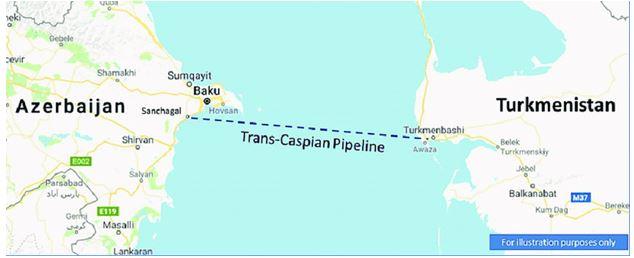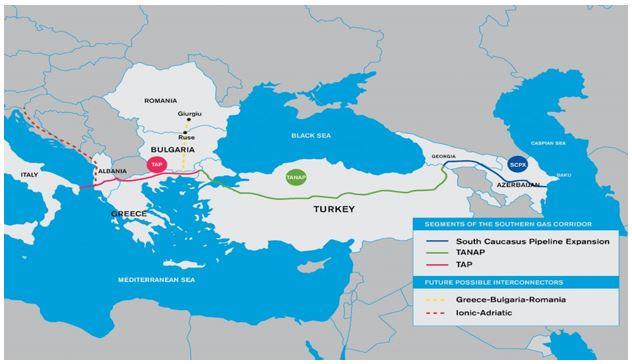| Sun. June 01, 2025 | |

|
|
|
By Ebrahim Rezaei Rad The Trans-Caspian Pipeline is a proposed project to transport natural gas from Turkmenistan to Europe via the Caspian Sea and then the Republic of Azerbaijan. This pipeline has been proposed as an alternative route to reduce Europe's dependence on Russian gas and diversify energy sources. The pipeline will be 300 kilometers long, starting from the Turkmenbashi gas field in Turkmenistan, passing under the Caspian Sea bed and connecting to the existing natural gas pipeline network in Azerbaijan. From there, natural gas can be transported to European markets through pipelines such as TANAP (Trans-Anatolian Gas Pipeline) and TAP (Trans-Adriatic Gas Pipeline). The Trans-Caspian Pipeline, as a strategic project, could be the missing link in the Southern Gas Corridor.
Trans-Caspian Pipeline
Southern Gas Corridor and its importance
Image of the Southern Gas Corridor by three pipelines The Southern Gas Corridor (SGC) is one of the most ambitious and strategically important energy projects in the world, designed to transport natural gas from the Caspian Sea region to Europe. The Southern Gas Corridor includes the South Caucasus, Trans-Anatolian and Trans-Adriatic pipelines. The length of this corridor is 3,500 km. It is planned that the Southern Corridor projects will be able to provide the necessary transportation capacity to deliver 60 to 120 billion cubic meters per year. The Southern Gas Corridor pursues several main and major objectives: 1. Diversify energy sources: The Southern Gas Corridor seeks to reduce Europe's dependence on Russian gas by providing an alternative supply route from the Caspian region. 2. Strengthen energy security: By creating multiple supply routes, this project will strengthen Europe’s energy security and reduce its vulnerability to energy supply disruptions. 3. Promote regional cooperation: This project will strengthen cooperation between the countries along the corridor and contribute to stability and development in the region. The Trans-Caspian Pipeline can affect the Southern Gas Corridor and play a key role in it in several ways: 1. Increasing the volume of natural gas transported: the Southern Gas Corridor could significantly increase Turkmenistan’s volume of gas transported to Europe and increase the amount of Central Asian natural gas exports to Europe. 2. Strengthening Europe’s energy security: With the addition of Turkmen gas, Europe will have access to a more reliable and diverse energy source, limiting their dependence on Russian natural gas, which has decreased since the start of the Ukraine war. 3. Completing the energy chain: This pipeline is the final link of the Southern Gas Corridor, which could provide a complete connection between Central Asia, the Caucasus and Europe, and in a way, is the final piece of the Southern Gas Corridor puzzle. Role of Key Actors The European Union, as the main gas customer, supports this project in order to reduce its dependence on Russian gas and to be able to adopt an appropriate approach and counter Russia's political weapon. Turkey, as a country through which the TANAP pipeline passes, plays a key role in transporting gas to Europe. In fact, Turkey's weakness in the field of natural resources, especially oil and natural gas, despite its discoveries in the Mediterranean Sea, is the reason why, after the war in Ukraine and the blocking of Ukraine's transit route to Europe. Turkmenistan can reach beyond the Caspian Sea through the Trans-Caspian Pipeline. Iran, which has been excluded from regional energy plans in recent years due to the policy of keeping Iran away from all projects, especially energy, by the United States, pipelines such as the Trans-Caspian could reduce Turkmenistan's dependence on its natural gas exports to the Caucasus and Europe via Iran, which is a significant issue for Iran Future scenarios 1. Success scenario: In a way, if legal disputes are resolved and international support is gained, the Trans-Caspian pipeline could complete the Southern Gas Corridor and strengthen Europe’s energy security. Although the Caspian Sea legal regime was signed in 2018, there are some disputes in this regard, and a very important point in this regard is the financing of the project. 2. Failure scenario: In this scenario, if political and technical challenges are not resolved, the project may be postponed or canceled. Challenges such as opposition from Russia and Iran, high cost and wear and tear of the pipeline, failure to attract foreign investment, and Europe’s lack of guarantees to purchase natural gas delivered by this pipeline for a long time can have a very significant impact on the implementation or non-implementation of the project. 3. Alternative scenario: In this scenario, if this project is not implemented, the countries of the region may turn to other options such as increasing exports of liquefied natural gas (LNG). A plan that came about especially after the war in Ukraine and the need for energy supply, and countries such as the United States and Qatar began supplying Europe with the natural gas it needed. Conclusion The Trans-Caspian Pipeline, as the missing link in the Southern Gas Corridor, could play a pivotal role in diversifying Europe's energy sources and reducing its dependence on Russian gas. Despite the existing political, legal, and financial challenges, the success of this project hinges on international cooperation, resolution of regional disputes, and securing sufficient investment. If realized, this pipeline would not only enhance Europe's energy security but could also serve as a catalyst for economic integration and regional stability. However, should the project stall, competition from liquefied natural gas (LNG) and alternative routes may overshadow this strategic initiative. The future of the pipeline largely depends on the engagement of key stakeholders such as the European Union, Turkey, and Turkmenistan as well as the effective management of geopolitical tensions with Russia and Iran. Ebrahim Rezaei Rad is a PhD candidate in International Relations and University lecturer. His primary area of research expertise lies in energy studies, energy security, and geopolitics. He ahs authored several scholarly articles in these fields and have presented my work at international conferences focused on energy and geopolitical issues. Additionally, he has co-authored several books on related topics in collaboration with other researchers.
|
|
| Contact Us | About Us | Donate | Terms & Conditions |
|
All Rights Reserved. Copyright 2002 - 2025



